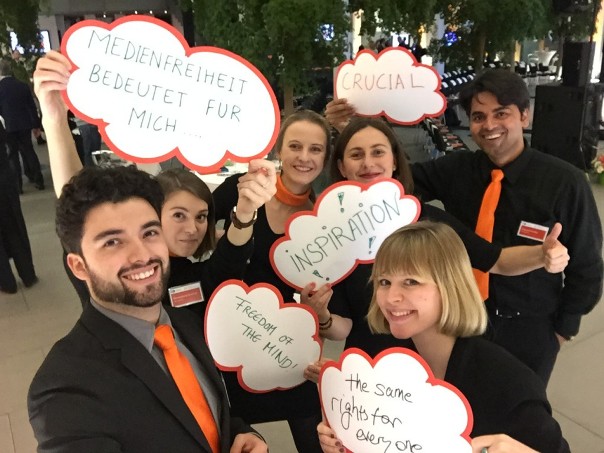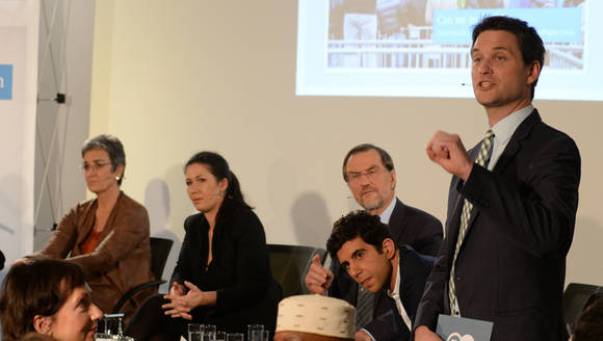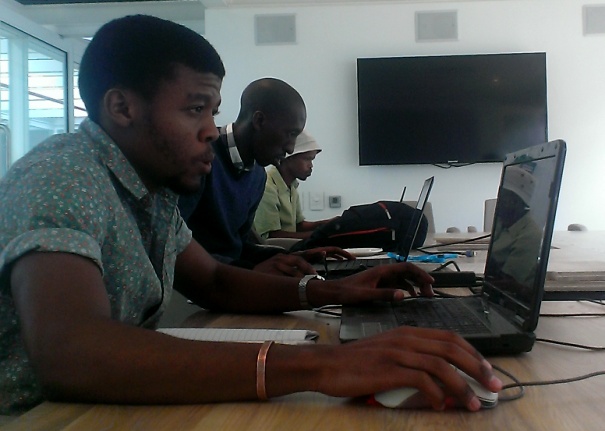A personal side to the refugee crisis
The massive influx of refugees into Europe presents a challenge for journalists to cover a story that has been saturated in the European media and somehow lost the human element behind the noise of statistics and politics. The voice of refugees themselves can become lost in the clamor and seeing their stories close up and first hand delivers a poignant and valuable perspective.
DW’s Documentaries and Reports is adding a personal angle to the refugee story with #MyEscape, a documentary special that shares what it is like to come to Europe as a refugee. Using videos and photos that refugees took themselves along the way combined with revealing interviews, #MyEscape allows the refugees to tell this important story in their own words.
The international and cultural expertise at DW played a huge role in conducting follow-up interviews in the refugees languages and in establishing an atmosphere of trust where people felt comfortable telling their stories.
#My Escape will air starting February 13 and is produced in cooperation with WDR and Berlin Producers.
DW journalists demonstrate the power of storytelling
What drives some people to push themselves to the edge and keep coming back to the world’s most rugged and treacherous mountains? DW sports journalist Stefan Nestler tells these stories and makes it clear that mountaineering is more than a sport, it’s a lifestyle.
Nestler’s mountaineering blog Adventure Sports takes a special look at people who live for reaching the next peak. The blog also places a special emphasis on life in the Himalayas – both for locals and the cadres of mountain adventurers whom descend on the region each year.
The blog recently won a Sport Media Pearl Award in the Journalistic Weblog category. The contest, organized by the International Sports Press Association (AIPS), is considered one of the most important international sports media awards and recognizes outstanding storytellers in sports.
Nestler dedicated the award to “climbers from all over the world who live their passion and to the mountain people who must work so hard.” But Nestler isn’t the only DW journalist being honored with awards.
Jaafar Abdul Karim, the host of DW’s Shabab Talk and other productions covering the Arab world ranked third place as Medium Magazine‘s “journalist of the year” in the category nationwide reporting. Medium said that that Karim was a “perfect mediator” between Germany and the Arab world. Karim uses a unique approach to storytelling that helps contextualize and clarify issues facing young Arabs. He also produces a video blog that keeps up with the latest issues and controversies.
Another distinction was presented by Kosovo’s public broadcaster, RTK, which honored DW’s Bahri Cani with a “Journalist of the Year” award. The journalist with DW’s Albanian department was recognized for live news reports in Albanian and Serbian, which provide a valuable service to speaker’s of both languages in Kosovo. Cani’s work also distinguishes DW as an objective and reliable source of information in the region.
Live reports from DW have been included in RTK’s morning broadcasts for more than three years. RTK also carries the Albanian edition of DW’s, Focus on Europe, along with Euromaxx, Drive it! and Tomorrow Today.
Two DW Portuguese for Africa correspondents were also recognized for their outstanding journalistic achievements and commitment to human rights. Braima Daramehat won a “Journalism and Human Rights” prize from the Observatório dos Direitos Humanos based in Guinea-Bissau. His work as director of the local youth broadcaster Rádio Jovem earned him the distinction. The station’s programming emphasizes human rights, freedom and democracy. DW’s radio dramas Learning by Ear and Crime Fighters are broadcast in Portuguese by Rádio Jovem.
Luciano Nagel, a DW correspondent in south Brazil won a Prêmio CNT de Jornalismo for his report on the working conditions for Brazilian truck drivers. Nagel has also produced stories for DW covering African refugees in Brazil.
DW has exciting opportunities for young journalists
The journalism traineeship from DW Akademie gives young journalists a unique chance to gain hands-on experience in professional media at Germany’s international broadcaster. DW’s paid traineeship covers a range of essential skills for modern journalists ranging from TV moderation and multimedia storytelling to data journalism and social media.
The application period, which begins on January 11 and closes February 29, is the first step of a challenging four-step process where applicants will showcase their talent and motivation. Selection is competitive and those who succeed can be assured that their fellow trainees share their drive and interest. Native speakers of English with good knowledge of German are especially encouraged to apply.
After an applicant is selected the traineeship begins in September. The 18-month program challenges perspectives and develops talent by combining practice with theory. Each trainee will spend time working with one of DW’s editorial departments writing and producing reports for radio, television and online.
DW trainees also participate in large-scale, international media projects. In 2015 the multimedia project “meine Oma, das Regime und ich,” won a CNN Journalist Award. The project was a collaborative effort from trainees who profiled their grandmothers’ experiences living under dictatorships. DW trainees also work in projects outside DW, like the SkillsXchange program, which was a group of young European journalists working on reporting the Prix Italia media awards.
Any further questions can be answered here.
DW provides a balanced perspective on the refugee crisis
The continuing influx of refugees into Europe has presented a divisive challenge to the EU, with discussions of entry quotas, border controls, blame and shame scattered across newspapers, websites and nightly broadcasts all over the continent. Germany and its refugee policy have been placed in the heart of the storm.
Recently in Brussels at the Representation of North Rhine-Westphalia to the European Union, DW hosted a panel discussion, “Can we make it? The impact of the media on Europe’s refugee crisis.” Experts, politicians and journalists explored how the ongoing refugee crisis in Europe is challenging the EU and what role the media plays.
The discussion was attended by around 200 people and presented unique and valuable perspectives from European politics and media.
Ulrike Lunacek, a European Parliament Vice-President from Austria, addressed the issue from the perspective of EU politics, saying that the refugee situation itself didn’t constitute a crisis, but rather lack of political will in the EU.
A plurality of ideas from different European media at the discussion showed that the portrayal of the refugee crisis differs from country to country. Jaafar Abdul Karim, the host of DW’s Arabic talk show Shabab Talk, pointed out that it was important for the media to get the point of view of refugees, rather than only reporting about them. Karim has produced a series of video blogs for DW and Spiegel Online where he frequently speaks with refugees. French journalist Adeline Percept said that French media differs from Germany, with reporting that tends to be “one-sided.” The Polish journalist Piotr Jendroszczyk said that the media in each EU member state was depicting a “different reality” of the refugee situation.
As Germany’s representative in the international media landscape, DW has an important role in explaining and clarifying the complicated implications of the refugee crisis, along with providing hard news reports of developing situations at borders and in refugee centers.
DW has even gone a step-further and provided an online guide to Germany for refugees in Arabic, Dari, Pashtu, Urdu, English and German. The website explains everything from visa and housing regulations to adapting to cultural norms and learning the language. As more refugees continue to arrive in Germany and the humanitarian challenges are addressed, the political discussion continues.
Whatever reality is chosen to be portrayed, the refugees are continuing to arrive and the EU continues to face a great challenge.
An edited version of the discussion will be aired December 15 on DW.
Designing mobile news solutions for South Africa
For programming wizards and creative techies, a hackathon is where their talent can really come alive. The intense air of competition fosters collaboration and promotes innovative solutions to complex problems.
DW hosted its first African hackathon recently in Cape Town, South Africa. Three teams gathered at the innovation center Workshop 17 for a 24-hour race against time to find a solution for providing news in places with poor Internet connectivity. The problem was how to compactly package news reports for consumption on low-data devices in areas with weak networks so that they remain appealing and relevant for South African users.
The three teams were composed of established South African web designers and developers along with web design students and budding experts. The mix of participants from different parts of Cape Town allowed for unique insight into how South Africans use digital news.
The winning team developed a tool that allows user-generated content (UGC) to be easily produced and quickly disseminated. UGC is quickly becoming an important resource for news broadcasters and providing capability to those with weak networks is a valuable service.
With the hackathon, DW could foster innovation in important technologies for African users while drawing attention to its special brand of international news. The event was organized with the assistance of the South African low-data social network Mxit along with the online radio aggregator iono.fm. Logistical support was also provided by Silicon Cape and Code4Southafrica.












Feedback